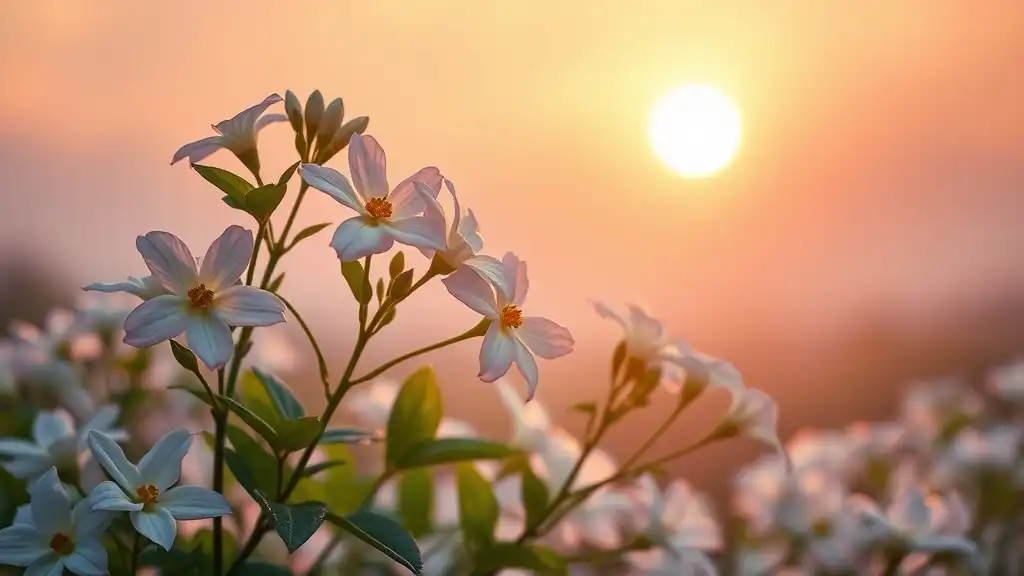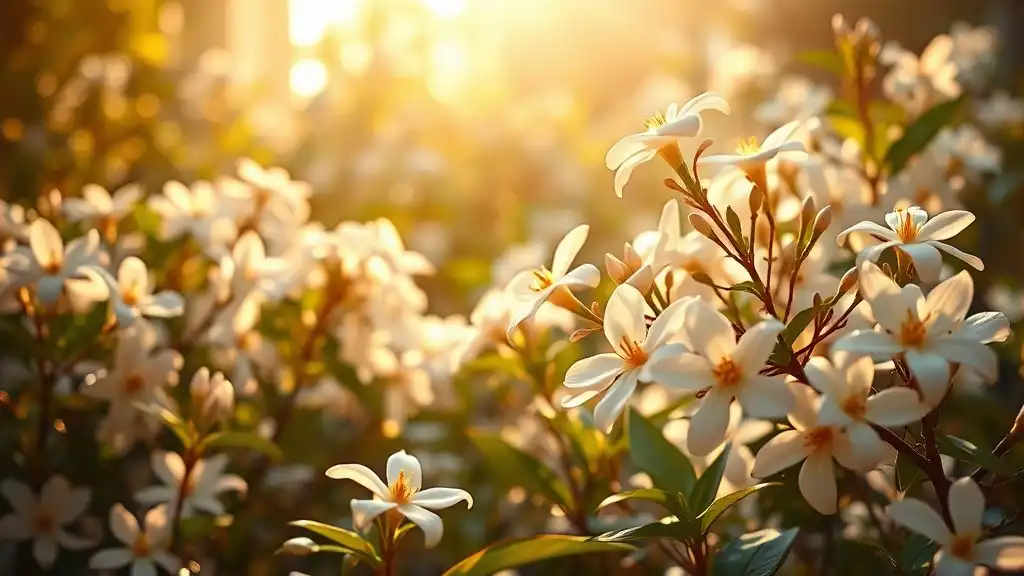Jasmine, a delicate and fragrant flower, has enchanted people for centuries, captivating the senses and enriching the spiritual lives of many. The significance of jasmine in various cultures reveals deep-rooted meanings and traditions that are worth exploring. In understanding the spiritual meaning of jasmine, we unlock its potential to inspire love, purity, and emotional healing.
The History of Jasmine
Cultural Significance
Jasmine's allure dates back to ancient civilizations, where it was celebrated not just for its beauty but for its medicinal properties as well. Cultures from the Middle East to Asia and beyond have recognized jasmine as a flower of high esteem, often used in perfumes and cosmetics. It is not uncommon to find jasmine adorning temples and homes as a symbol of hospitality and reverence.
In India, for example, jasmine is not only tied to personal adornment but is deeply woven into social rituals like weddings, symbolizing love and unity. This custodian of beauty reflects a rich tapestry of tradition, linking generations through its fragrance.
Jasmine in Religion and Mythology
In many religious texts, jasmine holds a revered place. It is often linked with divine entities and mythology, symbolizing spiritual elevation and enlightenment. For instance, in Hinduism, the flower is associated with Goddesses like Lakshmi and Parvati, representing love, prosperity, and feminine energy. These connections enhance its spiritual significance, encouraging devotees to appreciate beauty as a divine gift and embody it in their lives.

Spiritual Symbolism of Jasmine
Love and Romance
One of the most prominent symbols of jasmine is its association with love and romance. Its intoxicating scent has made it a favorite in romantic gestures, whether used in bouquets or essential oils. Historically, jasmine has been incorporated into wedding ceremonies, signifying the purity and flourishing nature of love.
The flower teaches us that love is not merely a physical commitment but an emotional bond, nurturing intimacy and warmth. Its delicate petals remind us to cultivate relationships with tenderness and care.
Purity and Innocence
Across various cultures, jasmine is also viewed as a representation of purity and innocence. Artists and poets have long used jasmine to convey themes of untainted love and beauty. The flower's pristine appearance and delightful fragrance often symbolize the divine quality of purity, encouraging us to reflect on our intentions and the authenticity of our actions.
In literature, jasmine frequently appears as a metaphor for the fleeting moments of purity that illuminate our lives, urging us to appreciate the inherent beauty in simplicity and honesty.

Emotional Healing with Jasmine
Aroma and Its Effects
The scent of jasmine is renowned for its calming and uplifting properties. Aromatherapy emphasizes the importance of jasmine essential oil for emotional healing, with studies suggesting its ability to reduce stress and anxiety. When inhaled, jasmine can trigger the release of serotonin, the "feel-good" hormone, offering solace during turbulent times.
Using jasmine in your daily routine—whether through essential oil diffusers, candles, or bath products—can transform your environment and mood, making it a powerful tool for emotional well-being.
Jasmine in Meditation and Mindfulness
Jasmine is not merely a flower; it is a guiding presence in spiritual practices. Using jasmine in meditation spaces creates a serene atmosphere, allowing deeper introspection and connection with oneself. Imagine lighting a jasmine-scented candle during meditation sessions—this blissful fragrance enhances focus, centering your thoughts and grounding your spirit.
Incorporating jasmine into mindfulness exercises can also serve as a reminder to embrace the present moment, promoting awareness of the beauty around you. The ritual of using jasmine reinforces the significance of nature in our spiritual journeys.

Jasmine in Dream Interpretation
Common Themes Involving Jasmine
Dreaming of jasmine can often signal emotional awakening, suggesting themes of love and beauty. Such dreams might encourage us to explore relationships or reconnect with our inner selves, reflecting a desire for connection.
Consider the nature of the dream—is it positive, invoking joy and warmth, or does it involve loss or longing? These nuances can reveal deeper layers of meaning, guiding you toward exploring personal feelings and aspirations.
Personal Reflections
When jasmine appears in dreams, it often serves as a personal reflection, gently nudging you to evaluate your life journey. These dreams can prompt you to nourish relationships, whether by seeking forgiveness or expressing love more freely. The appearance of jasmine may suggest that now is the time to appreciate life's beauty and to share our genuine emotions with those we care for.

Practical Uses of Jasmine in Spiritual Practice
Jasmine Essential Oils
Jasmine essential oils are a versatile aspect of spiritual practice. A few drops can be used in meditation, promoting relaxation and enhancing spiritual connection. You might also consider using jasmine oil in your yoga practice, where the combination of movement and scent can deepen your focus and mindfulness.
Another beautiful way to embrace jasmine is by creating a sacred space in your home. Adding jasmine oil to your altar or personal sanctuary allows the fragrance to uplift your spirit, creating an inviting environment for meditation and contemplation.
Jasmine Flowers in Rituals
Incorporating jasmine flowers into spiritual rituals can enhance their significance. Jasmine can be added to offerings or used in ceremonies to invoke love and purity. Whether placed in a bowl of water, woven into wreaths, or offered on an altar, these rituals can deepen the connection to one's spiritual path.
Moreover, using jasmine flowers during seasonal celebrations or personal milestones can amplify the intention of those events, cultivating a sense of gratitude and joy.

Conclusion
In summary, jasmine possesses a rich spiritual significance that resonates deeply within us, symbolizing love, purity, and emotional healing. Its enchanting fragrance and cultural history invite us to explore these concepts in our lives, reminding us of the beauty and power contained within nature. By nurturing our relationship with jasmine, we can embark on a personal journey toward spiritual enlightenment, emotional clarity, and the celebration of love in all its forms. Through the delicate petals of jasmine, we find not only beauty but also profound wisdom—an invitation to reflect, connect, and grow.



















